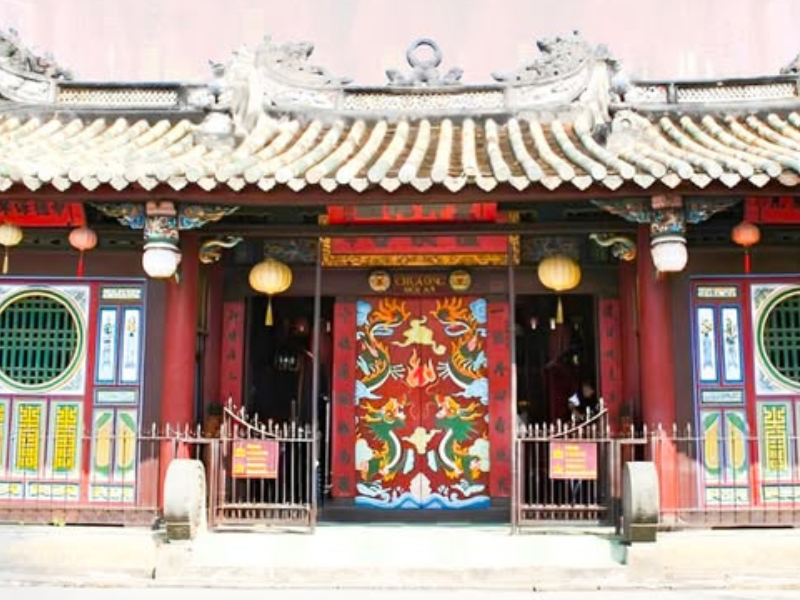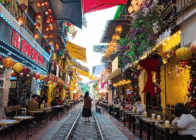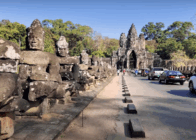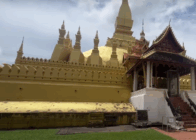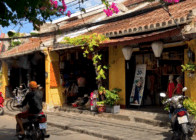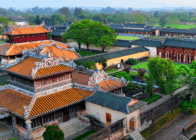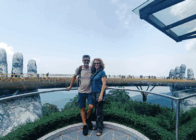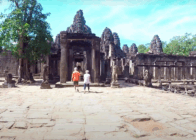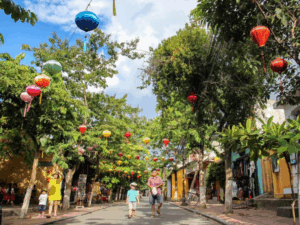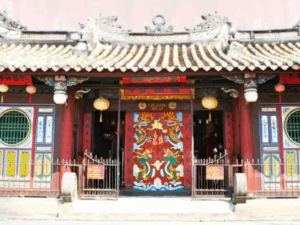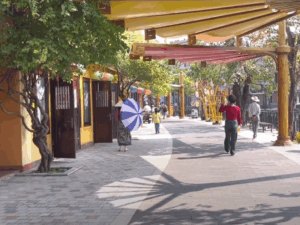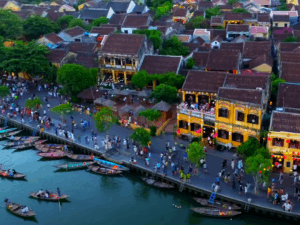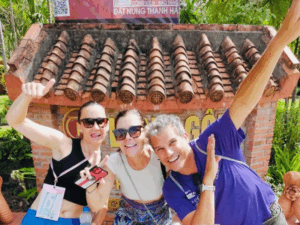Introduction to Quan Cong Temple in Hoi An
Nestled in the heart of Hoi An, Quan Cong Temple is more than just a place of worship. Built in 1653, this temple stands as a tribute to Quan Cong, a revered general known for his loyalty, bravery, and integrity. Locals believe that his spirit protects them, bringing fortune and peace to their lives. When you step into the temple, you’re not just entering a historical site; you’re walking into centuries of stories, traditions, and spiritual reverence.
The Temple’s Inception
Quan Cong Temple was constructed during the Nguyen Dynasty, a period marked by cultural flourishing and architectural marvels. The temple’s inception was driven by the need to honor General Quan Cong, whose legacy has transcended generations. His virtues of loyalty and courage are not just celebrated; they are deeply ingrained in the local culture.
Relation to Quan Cong
Quan Cong is not just a historical figure; he is a symbol of integrity and loyalty in Vietnamese culture. His life and deeds have been immortalized through the temple, making it a beacon of moral values. The temple serves as a constant reminder of the virtues that Quan Cong stood for, inspiring both locals and visitors.
Place in History and Culture
Positioned in Hoi An, a city known for its ancient town and cultural heritage, Quan Cong Temple holds a special place. It has witnessed the ebb and flow of history, standing resilient through time. The temple isn’t just a monument; it’s a living testament to Hoi An’s rich cultural tapestry.
Exploring the Architecture
Quan Cong Temple is a masterpiece of architecture, blending Chinese and Vietnamese styles seamlessly. Every inch of this temple tells a story, from its intricately designed roof to its meticulously crafted statues.
Unique Blend of Styles
The architecture of Quan Cong Temple is a harmonious blend of Chinese and Vietnamese elements. The temple’s layout follows traditional Chinese architectural principles, while its decorative elements are distinctly Vietnamese. This fusion creates a unique aesthetic that is both captivating and culturally significant.
Specific Architectural Elements
One of the standout features of Quan Cong Temple is its roof, adorned with dragon and phoenix motifs. These symbols represent power and prosperity in Vietnamese culture. Inside, you’ll find beautifully carved wooden altars, each telling a story of its own. The use of vibrant colors and intricate designs adds to the temple’s allure.
Symbolic Meanings
Every architectural element in Quan Cong Temple carries symbolic meanings. The dragons on the roof symbolize strength and protection, while the phoenix represents rebirth and renewal. The placement of statues and altars follows principles of Feng Shui, believed to bring harmony and balance.
The Spiritual and Cultural Importance
Quan Cong Temple is not just an architectural marvel; it’s a spiritual haven. The temple plays a vital role in the cultural and spiritual life of Hoi An’s residents.
Religious Practices
The temple is a focal point for various religious practices. Devotees visit regularly to offer incense and prayers to Quan Cong. The rituals performed here are deeply rooted in Vietnamese Buddhist traditions, reflecting the community’s spiritual devotion.
Role in Local Festivals
Quan Cong Temple is a central venue for local festivals, particularly during the Lunar New Year. The temple comes alive with vibrant decorations, traditional music, and elaborate ceremonies. These festivals are not just celebrations; they are expressions of cultural identity and communal unity.
Practices of Worshippers
Visitors and worshippers follow specific practices when visiting the temple. Offering incense, participating in chanting sessions, and making donations are common acts of devotion. These practices foster a sense of community and spiritual connection among the worshippers.
Guided Tour
For those who can’t visit in person, a virtual tour of Quan Cong Temple offers a glimpse into its splendor. Here’s a walkthrough of the temple’s main sections and significant artifacts.
Main Sections
Upon entering, you’re greeted by the grand entrance, which leads to the main hall. The main hall houses the statue of Quan Cong, surrounded by altars and offerings. Adjacent to the main hall are smaller chambers dedicated to other deities and historical figures.
Important Artifacts
The temple is home to several important artifacts, including ancient scrolls, ritual vessels, and antique statues. Each artifact has its own story, adding depth to the temple’s historical and cultural narrative.
Unique Features
One unique feature of the temple is its courtyard, adorned with bonsai trees and traditional lanterns. This serene space provides a tranquil setting for reflection and meditation, enhancing the overall spiritual experience.
Lesser-Known Facts
Beyond its well-known history and architecture, Quan Cong Temple holds several lesser-known facts that add to its intrigue.
Hidden Stories
One lesser-known story is about a hidden treasure believed to be buried within the temple grounds. Legend has it that this treasure was buried by the temple’s founders to protect it from invaders. While the treasure has never been found, the story adds an element of mystery to the temple.
Interesting Facts
Did you know that the temple’s roof tiles were imported from China? These tiles are made from a special ceramic that gives them their unique color and durability. Another interesting fact is that the temple once served as a refuge for revolutionaries during the French colonial period.
Historical Anecdotes
Historical anecdotes about Quan Cong Temple reveal its role in various significant events. During the 19th century, the temple was a meeting place for anti-colonial activists. These stories highlight the temple’s importance beyond its religious significance.
Visitor’s Guide
Planning a visit to Quan Cong Temple? Here’s a practical guide to help you make the most of your trip.
Opening Hours
Quan Cong Temple is open daily from 8 AM to 5 PM. The best time to visit is early in the morning when the temple is less crowded, allowing for a more peaceful experience.
Entry Fees
There is a nominal entry fee to visit the temple, which helps in its maintenance and preservation. Discounts are available for students and senior citizens, making it accessible to a broader audience.
Tips for a Meaningful Experience
To make your visit more meaningful, take the time to learn about the temple’s history and significance. Respect local customs by dressing modestly and refraining from loud conversations. Don’t forget to explore the nearby attractions in Hoi An, enriching your cultural experience.
Conclusion
Quan Cong Temple is more than just a historical landmark; it’s a spiritual sanctuary and a cultural treasure. Its rich history, architectural beauty, and spiritual significance make it a must-visit destination in Hoi An. Whether you’re a history enthusiast, travel blogger, or spiritual seeker, the temple offers a unique and enriching experience.
The Quan Cong Temple in Hoi An is a remarkable site that is deeply steeped in the spiritual and cultural traditions of Vietnam. From the intricate woodwork and artifacts to the rich mythology and folklore of the country, there is something here for everyone. Whether you are interested in history, culture, or spirituality, Quan Cong Temple is a site that is not to be missed. So, come and explore this fascinating destination, and experience the rich heritage and traditions of Vietnam for yourself.
Take a moment to reflect on the temple’s significance and consider sharing your own experiences or thoughts about Quan Cong Temple. Your insights could inspire others to explore this magnificent site and discover its many wonders.
- Uncover Cambodia’s Hidden Charms 6 Days / 5 Nights (177 views)
- The Best Exotic Vietnam – 16 Days / 15 Nights (121 views)
- The 10 Best Tour Operators in Vietnam for 2025: An Expert, Objective Review (112 views)
- Seamless Cruise: Halong Bay to Da Nang – Fostering smooth travel experience from Halong Bay to Da Nang. (84 views)
- Discover the Enchanting Culture of Hanoi in Every Sense (80 views)

